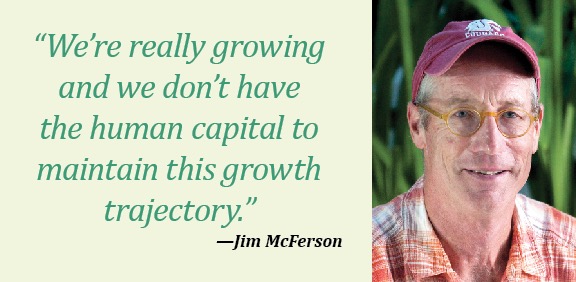Washington State University is teaming up with Washington tree fruit producers to convince young people that there are worthwhile careers in the tree fruit industry, and there’s much more to it than just picking apples.
Dr. Kimberlee Kidwell, director of WSU’s Center for Transformational Learning and Leadership, said agriculture has an image problem that deters students from considering careers in that sector and she would like to find a way to ignite their interest.
“People think they’re going to be involved in the harvest piece only, that they’re going to be doing hands-on labor that’s difficult and even not desirable, but there’s so much more to it than that. I don’t think people imagine the diversity of opportunity out there and how they might fit in.
“We’re in the myth-buster stage in terms of what it’s like to be a vibrant contributor to the tree fruit industry,” she added. “We’re asking industry partners: ‘Help us tell your story, and tell what you do and why it matters.’”
 Jennifer Witherbee, executive director of the Washington Apple Education Foundation, which provided 223 scholarships this year to help pay for college education, confirmed that working in the tree fruit industry is not what most students aspire to, particularly Hispanic teenagers whose parents did orchard work.
Jennifer Witherbee, executive director of the Washington Apple Education Foundation, which provided 223 scholarships this year to help pay for college education, confirmed that working in the tree fruit industry is not what most students aspire to, particularly Hispanic teenagers whose parents did orchard work.
“They say, ‘I’m going to college because I don’t want to work in the tree fruit industry.’”
But, in fact, the Pacific Northwest tree fruit industry, which is in an expansion phase, urgently needs graduates in horticulture, agri-business, pest management, postharvest handling, engineering, and other fields. And they are high-tech, high-paying jobs.
This summer Kidwell and colleagues from WSU visited major tree fruit employers to find out how they could work together to highlight career opportunities. They encouraged employers to hire WSU students as interns so they learn about the industry and gain experience. Kidwell said the university wants to make sure it is graduating people with the skill sets that fit the industry so they are “job ready, day one.”
“We want to soften the boundary between academia and industry so industry folks are having an influence on what’s happening with our student body,” she said.
The WSU team, accompanied by Dr. Jim McFerson, manager of the Washington Tree Fruit Research Center, heard a common theme from the tree fruit companies they visited.
“Everyone says the same thing: ‘We can’t find people. We’re looking for the best we can. A lot of times we’re retraining someone that maybe isn’t really qualified for some of the jobs we’re asking them to do,’” he reported.
Internships
WSU has partnered with the Research Commission in a pilot program that will allow students interested in integrated plant science majors to gain early research experience in a field relevant to the tree fruit industry and learn about career opportunities.
Incoming students can apply for stipends of $2,500 and partner with faculty members in the College of Agriculture, Human and Natural Resource Sciences in order to gain research experience.
Successful students will go on to spend a semester with a scientist working on a tree-fruit project funded by the Research Commission and spend the summer working with a collaborating scientist at a WSU Research and Extension Center in Prosser or Wenatchee.
After completing those requirements, students will be eligible for paid summer internships with tree fruit industry partners during which they can develop work skills.
McFerson said it’s a way to help ensure that the next generation has the capabilities that the tree fruit industry needs as it expands and as market demands change.
“We’re really growing and we don’t have the human capital to maintain this growth trajectory,” he said.
Kidwell said some tree fruit companies begin recruiting at WSU as early as September among students who will graduate in May so they can “cherry pick” high-caliber candidates. Many of this year’s graduates from the College of Agriculture had a couple of viable job options and most had jobs by June, unless they were going to graduate school.
But there are still many employers who aren’t aware of the opportunity to partner with WSU to recruit young people to the industry, she said. •
More Info:
Herb Lengel, WSU’s internship and career development coordinator, said his office can help match up employers and students by posting internships and job openings, collecting résumés, or providing interview space. He can be reached at (509) 335-0049 or herbert_lengel@wsu.edu






[…] Back in August I attended USApple’s Outlook event, a gathering of apple industry executives from around the world looking to learn about the US apple crop (red delicious) forecast. In order to prepare for this event, I spent my free time reading articles from industry fruit magazines so I could ask questions and talk shop with other attendees. Usually, I have little in common with these articles because I don’t grow the grocery store apple varieties/don’t yet own an orchard/don’t use chemicals/don’t have access to legal migrant labor/don’t live in the Western States, but there was one particular article I felt qualified to address in August’s Good Fruit Grower magazine titled “Developing Tomorrow’s Workforce.” […]